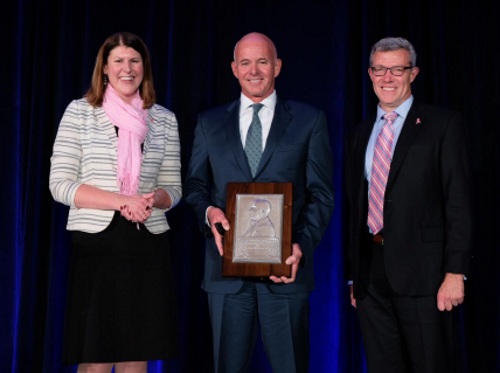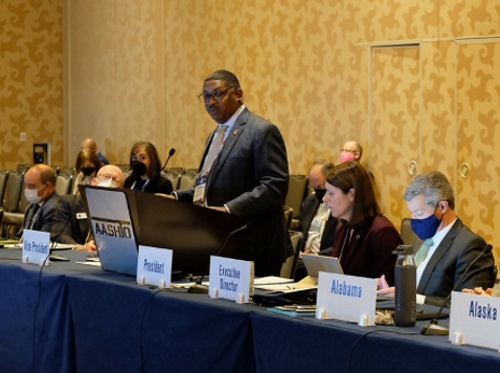In a speech following his election as the 2021-2022 president of the American Association of State Highway and Transportation Officials, Dr. Shawn Wilson (seen above at left with outgoing AASHTO president Victoria Sheehan) said transportation leaders must embrace a “new normal” that incorporates diversity, equity, and inclusion or DEI strategies into their organizations.

“The gravity of this moment, insignificant for some, is not lost on me in the larger scheme of the order of the universe,” explained Wilson, who has served as the secretary of the Louisiana Department of Transportation and Development since 2016.
“You have heard that I view my public service as a ministry and – while not intending to proselytize in this role – I am not ashamed of the inspiration to seek this leadership opportunity and the establishment of priorities that I hope long outlive my short tenure of this office of AASHTO president,” he said.
“While I boldly support and agree with the Biden administration’s spotlight on diversity, equity, and inclusion, if these principles are really enduring, [they] will be a game-changer in modern public policy,” Wilson noted. “I admit I am a skeptic when it comes to real cultural and institutional change of this magnitude. Perhaps I have seen too much and lived too long to think differently. Therefore, I submit to you that we if we do not act now to sustain the principles of DEI by incorporating a framework and measures of accountability, we will surely take backwards steps as a nation and as an industry. The social and political tensions and divisions we see today is an indication of the future challenges.”
He said that “cementing” the principles of equity and partnerships into the fabric of AASHTO and the state DOT community also offers “sustainable solutions” to workforce challenges being experienced by state DOTs both today and tomorrow while also ensuring AASHTO is a leader of cultural change among peer associations.

To that end, Wilson advocated for a “new normal” among state DOTs to identify and sustain “pathways to equity” throughout the transportation industry:
A “new normal” ensures hiring and promotions will be reflective of the communities state DOTs all serve, enriching the quality of state DOT workplaces while minimizing bias and challenging “unacceptable norms,” he said.
He added that it also means expanding project development and delivery benefits while ensuring that the negative effects of infrastructure are not concentrated in the communities that look differently than those of project decision makers.
Wilson pointed out that this “new normal” ensures that the contracting and exchange of resources involved in delivering infrastructure is equitable, helping lead to equitable employment in populations that are not well represented today’s state workforce.
It also ensures the decisions and priorities are leveraged to produce results greater than the combination of inputs, he said.
Wilson noted that delivering on those “new normal” efforts would also help broaden the conversation on issues that matter most to state DOTs and other entities with similar interest across the country. It would also force a “more critical and validating” assessment of what is important in terms of state DOTs delivering on their missions to their states and to the country as a whole.
“I am not asking you to adopt ideas and approaches that are contrary to your state and agency,” he stressed. “You know best what limiting factors you have and the risk associated with them. I am asking you to broaden these ideas. It is more than race. It speaks to gender, it speaks to age, it speaks to discipline, and, yes, it speaks to economic classifications. I am asking you to start that conversation.”
 AASHTO Annual Meeting
AASHTO Annual Meeting


